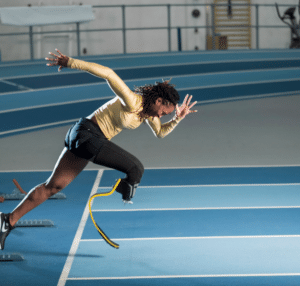 Femita Ayanbeku is a world-class runner, a two-time Paralympian, World Champion bronze medalist in the 200m and the current U.S. record holder in the 100m sprint. She’s been featured in PEOPLE Magazine and in a television, commercial seen around the world. But no matter what Femita’s already accomplished, she always keeps moving forward. Currently, she’s training in hopes of becoming the fastest female amputee on earth by setting the World Record in the 100m T64 category.
Femita Ayanbeku is a world-class runner, a two-time Paralympian, World Champion bronze medalist in the 200m and the current U.S. record holder in the 100m sprint. She’s been featured in PEOPLE Magazine and in a television, commercial seen around the world. But no matter what Femita’s already accomplished, she always keeps moving forward. Currently, she’s training in hopes of becoming the fastest female amputee on earth by setting the World Record in the 100m T64 category.
One of eight children, Femita grew up just outside of Boston. When she was 11 years old, her family was involved in a serious car accident. Femita’s badly damaged right leg cut off the circulation to the rest of her body. Fortunately, doctors were able to perform a life-saving emergency amputation surgery. The ‘tween and teen years can be challenging for everyone, but especially for a young person with traumatic limb loss. Adjusting to life as a new amputee, Femita felt self-conscious about her appearance, recalling, “I was very insecure about my physical appearance, particularly between the ages of 11 and 18. I covered up and didn’t want to go out.”
How Others’ Confidence Inspired Her
At age 18, Femita experienced a change of heart about her appearance. “I got kind of sick of worrying about what others thought about me. And I stopped trying to appear the way I thought others wanted me to look,” she says. She credits seeing other amputees and people with other-abilities who were comfortable in their own skin, which gave her the confidence to own her identity as a woman with limb loss.
“They were comfortable with themselves, and that helped me to start feeling confidence in myself, as well,” Femita says. Fast forwarding to today, she is far from shy or embarrassed about her limb loss. Instead, she says, “My goal on a daily basis is to make sure people see my prosthetic leg. I want them to see my confidence, and to be able to take that for themselves. If there’s a chance another amputee or person with other-abilities sees me wearing my confidence, it might help them, as well.”
A Running Prosthesis Introduces A New World
In 2015, Femita received a grant from the Challenged Athletes Foundation and was given a custom Össur running prosthesis during one of the several free Mobility Clinics the two organizations host around the U.S. each year. “Receiving my Cheetah was a huge gift, because insurance would not pay for a running prosthesis,” she says. “I was never an athlete until I got a running leg, and I didn’t know how much I loved running until I started doing it. That day at the Mobility Clinic, a whole new world opened up to me.”
Paralympic sprinter and fellow Bostonian Jerome Singleton encouraged Femita to pursue running more seriously and she started training in earnest, spurred by his belief in her potential. “To this day, I owe so much to Jerome for helping me. The life I have today is because of track,” she says. Her hard work paid off: literally months after receiving her first running blade, Femita qualified for the U.S. Paralympic Team and competed at the 2016 Rio Paralympics, placing 6th in the 200m finals.
Four years later, she qualified to compete at the Tokyo Paralympics for Team USA in the 100m and 200m. The Games, originally scheduled for 2020, were delayed until 2021 due to the global coronavirus pandemic. Unfortunately, Femita tested positive for COVID-19 in Tokyo and did not compete in the finals of either of her events.
Such a heartbreaking outcome might have caused some people to quit competitive sports altogether, but for Femita, it just fueled greater resolve. “One thing I’ve learned along the way is that failure is not an ending but a beginning. You can make it the starting point for your next success,” she says. “You don’t have to listen if people say there’s something you can’t do. You just have to try, regardless. I keep trying, and I’m ready to show the world what I can do.”
Just as Femita was mentored by Jerome Singleton, she has been able to pay it forward, helping others. While enroute to a limb difference camp, she saw another woman with a prosthesis at the Boston Airport: Noelle Lambert, who had experienced a traumatic below‑knee amputation while in college and was considering learning how to run track. “Noelle and I hit it off right away. I knew this was my chance to give back, just as I had been trained by Jerome,” Femita says. Today, the two women train together four days a week, and Femita says, “we’re like sisters now.”
These days, Femita practices on the track in her Massachusetts hometown and lifts weights in the gym each day, working nights as a certified personal trainer. She serves on the board of two different nonprofit organizations, and does volunteer work. She is a fearless and consistent champion for body positivity, regularly posting before-and-after photos of herself on her Instagram account. She radiates confidence, and her followers love her honest posts about the transformation she has experienced and openly documents.
“Lots of people have insecurities about their physical appearance,” she says. “I tell them, learn from me. Don’t waste years of your life like I did, worrying about what people think. I am a girl with one leg, and I own who I am today. I want others to be able to do that for themselves, as well. “Life isn’t just about me,” Femita concludes. “I like to give back, and I need a bigger purpose than just focusing on myself. I want to help as many people as possible get to where they want to go. It’s important that we help each other, and when people see me giving back, I think that’s pretty powerful.”

